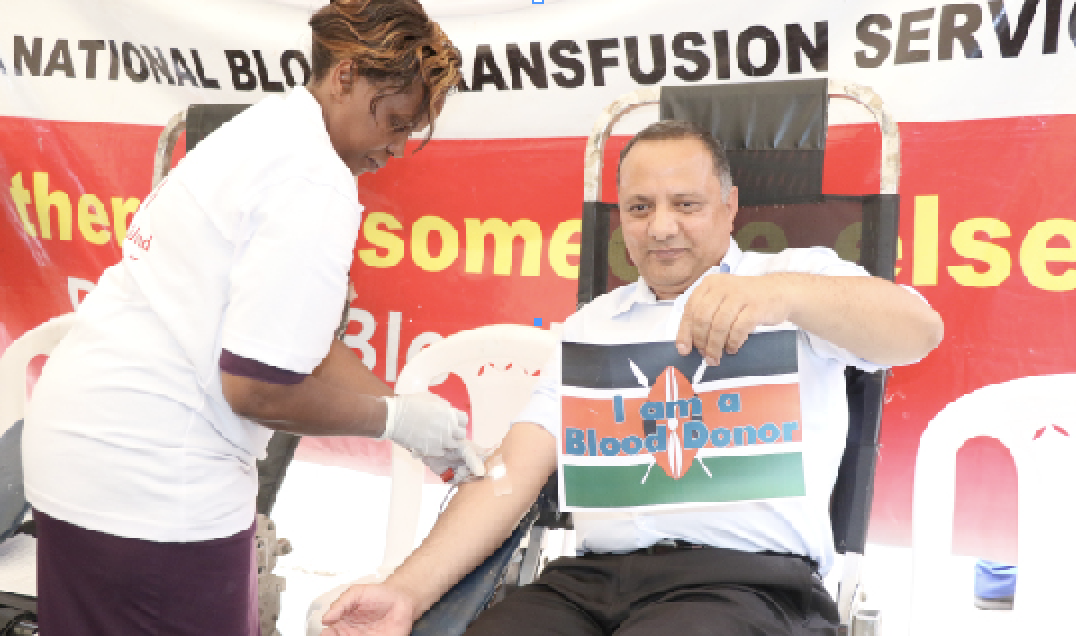Blood donor: I’ll save lives even in death

The highest active blood donor in the world Arjun Prasad Mainali, now on a visit of Kenya, hopes to save lives even in death; his heart will be up for harvest.
Speaking to People Daily in Nairobi when he graced the National Blood donation advocacy campaign on Wednesday, Mainali said he has donated more than 85 litres of blood in the last 32 years.
“Going by the World Health Organisation (WHO) standards of one unit of blood saving three lives, I have saved at least 500 people,” he said.
The US citizen and native of Nepal revealed that his donation is not limited to blood but all his organs that would be functional when he dies.
“When I was applying for my US identity card, I was asked if I would like to donate my organs once I die, I could not hesitate to accept because I started donating blood while in Nepal,” said the donor who has dedicated his life to serve and save others.
“Any organ from cornea to eyes and the heart that will be in good condition according to medics, will be harvested to help another person live. But for now, I am concentrating on blood donation,” he said.
Save millions
The legal framework governing organ donation in the US is built on principles uniquely designed to support the system of transplantation, which has worked to save millions of lives.
Here in Kenya, though a new law governing organ donations was enacted on July 2017 (Health Act, 2017), failure by the Cabinet secretary for Health to gazette rules for the approval of organ transplant facilities has left patients to die.
The failure has also left public hospitals stretched—as no new facilities can be “duly authorised” without the regulations in place.
Speaking at the event at the National Archives ground on Wednesday, Health Cabinet Secretary Sicily Kariuki said her ministry is in the process of gazetting the rules through a new department—National Blood Transfusion Services and Human Organs Transplantation.
She said the department would create a regulatory framework on organ transplant.
The new law allows a person, who is competent to make a will, to donate body or any specified tissue to a person or institution of his choice after death.
Such consent can also be given by a spouse, elder child, parent, guardian, elder sibling in the event the person dies without leaving behind a will.
Widely travelled
In the event the relatives of a deceased person cannot be traced and no will is left behind, the Health CS would have powers to donate the body or its parts.
The proposed law says the organs donation must be done for free and those in breach face a fine not exceeding Sh10 million or imprisonment for a period not exceeding 10 years or both.
Meanwhile, on blood donation, Mainali revealed his wife only donated blood once.
“My wife has donated blood once but is due to a medical condition, she has low blood pressure but I am donating on behalf of her and I have been in six continents,” he said.
Having travelled to more than 16 countries he has donated blood 172 times and has reached out to millions of people globally in his blood donation campaigns.
“Of the 172 donations, 123 of them are whole blood while 49 were platelet concentrates.
Cumulatively, I have donated a total of 85.5 litres of whole blood and platelets combined,” he said.
The award-winning donor has been awarded Leo of the Year Award, Presidential Volunteer Service Award, Certificate of Special Congressional Recognition and Leader of the Year from Nepalese Association in Southeast America among others.
Kenya’s best
Mainali has been creating awareness on blood donation in Kenya since Monday till yesterday.
“I am a strong believer of humanitarian services and I contributed immensely to establish a society that believes in social responsibility,” he said.
Kenya’s highest male and female blood donors Alpha Kennedy Sanya and Aisha Dafalla accompanied him on his mission.












